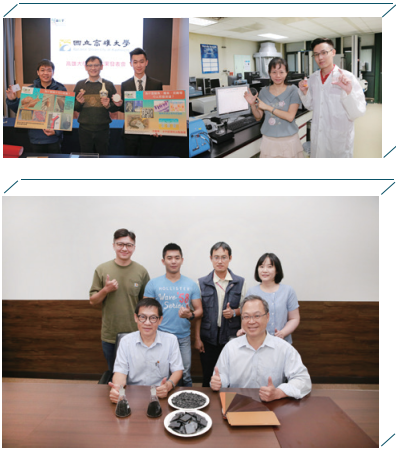Department of Chemical and Materials Engineering化學工程與材料工程學系
homeWebsite
Development Characteristics
At NUK, the Department provides a vigorous education to prepare students to become highly qualified chemical and materials engineers and tomorrow’s technology leaders. Additionally, the Department aims to expand and advance the frontiers of technology through research and innovations.
Our initiatives focus on three major themes:
■ Nano and Molecular Engineering
■ Advanced Materials Technology
■ Biochemical Engineering

Goals
| ► | To provide students with a solid foundation in both chemical and materials engineering. |
| ► |
To cultivate students with a liberal arts education, critical thinking, effective verbal and writing ability, and research and innovation ability.
|
本系旨在培育學生具備化學工程與材料工程的學識專長,理論與應用能力兼備,同時培育學生具有寬廣的通識涵養、開闊的胸襟、關懷人文的素養與研究創新的能力。在必修課程方面,學生將接受完整的化工與材料的訓練,具備化工與材料方面之基本與重要核心學識。選修課程部份,一方面提供化工與材料各相關領域如奈米、生技、光電、電子、半導體、能源等基礎課程,使學生具備基礎學識,畢業後有充足的能力吸收新知,並有能力應用甚至開創新興的科技;另一方面提供現今各高科技領域之專業課程。
本系設計並建立專屬化工與材料的實驗室與實驗課程如材料化學實驗、化工材料實驗等,期能訓練學生瞭解理論又懂實務,能動腦亦能動手,成為手腦並用具備研發創意能力的高科技人才。為符合台灣重點產業需求,設定發展方向如下:
◇ 奈米與分子工程:課程將賦予學生奈米與分子的視野和知識,使能完全參與現代與未來高科技工程實務。奈米科技與分子工程領域的課程有助於學生在特用化學品、奈米材料與精密化學品之研發與製造。
◇ 尖端功能性材料:目前國內的資訊半導體工業及光電工業已成為國內重要產業,由於科學園區和科技工業區的設立,可預期國內的光電及半導體工業需要大量的化工及材料科技人才。因此本系規劃材料技術,其重點在奈米材料、光電材料、半導體材料及電子特用化學品之製造與應用。
◇ 生醫工程及材料:近年來,科學研究在基礎基因工程與微生物學的快速發展下,「生物技術」已成為下一世代另一個耀眼的產業,生物科技與生化工程所包含的範圍,從醫學技術、醫藥保健、食品營養、農業生產、污染防治甚至能源工業等,廣泛涵蓋了人類生活的多數領域。生化工程之基本製程為化工基礎課程,因此本系培養學生具備生化領域之化工應用能力,使能提升國內生物技術的水準,為國內新興產業提供優秀的生化科技人才。
Postgraduate Opportunities
| ■ | Advanced Degree Study |
| Graduates may pursue an advanced degree in chemical engineering, materials engineering, nanotechnology, chemistry, biochemistry, environmental engineering, energy technology, biomedical engineering, management, electrical engineering, information engineering, industrial engineering, etc. | |
| ■ | Career Opportunities |
| Students have a broad array of industry options available upon graduation: electronics, optoelectronics, semiconductor, materials, petroleum, chemistry, biotechnology, pharmaceutical, environmental protection, mechanical and metal industries. Our graduates’ average salary is usually higher than graduates whose majors are arts, law, or management, and is also one of the highest among science and engineering graduates. According to statistics, chemical engineers in Taiwan can make, on the average, an annual salary of NT $1000K within 5 years of graduation. |
|
Future Outlook
Currently our department is strengthening its teaching and research laboratories with new equipment and modern instrumentation. These laboratories will allow us to better train our students to acquire the necessary experimental techniques and research capabilities.
At the same time, we are planning to establish a new Ph.D. program in nanotechnology and chemical& materials engineering to offer Ph.D. degree in addition to the present MS program. These programs intend to provide the highly skilled engineers and researchers necessary to meet the demand for talent of Taiwan’s technological development.
|
Courses Offered
■ Compulsory Courses
| Master | ||||||||
|
||||||||
■ Elective Courses
| Master | ||||||||
Core Courses:
► Nanobiomaterials ► Thin Film Engineering ► Scientific English ► Special Topics on Electrochemistry ► Ceramic Material engineering Special Topics on Polymer |
||||||||
| ■ | Remarks: |
|
The minimum number of credits is 136 for a BS degree (including 77 departmental compulsory credits, 27 departmental elective credits, 4 university compulsory credits; and 28 general education credits) and is 24 for an MS degree.
|





